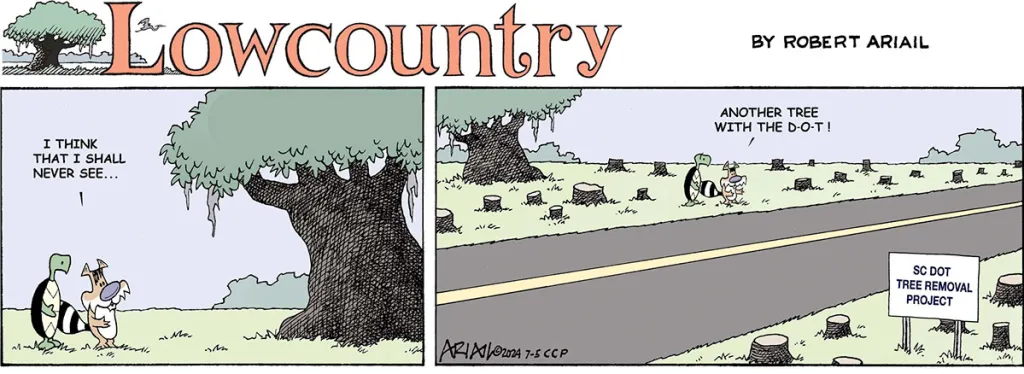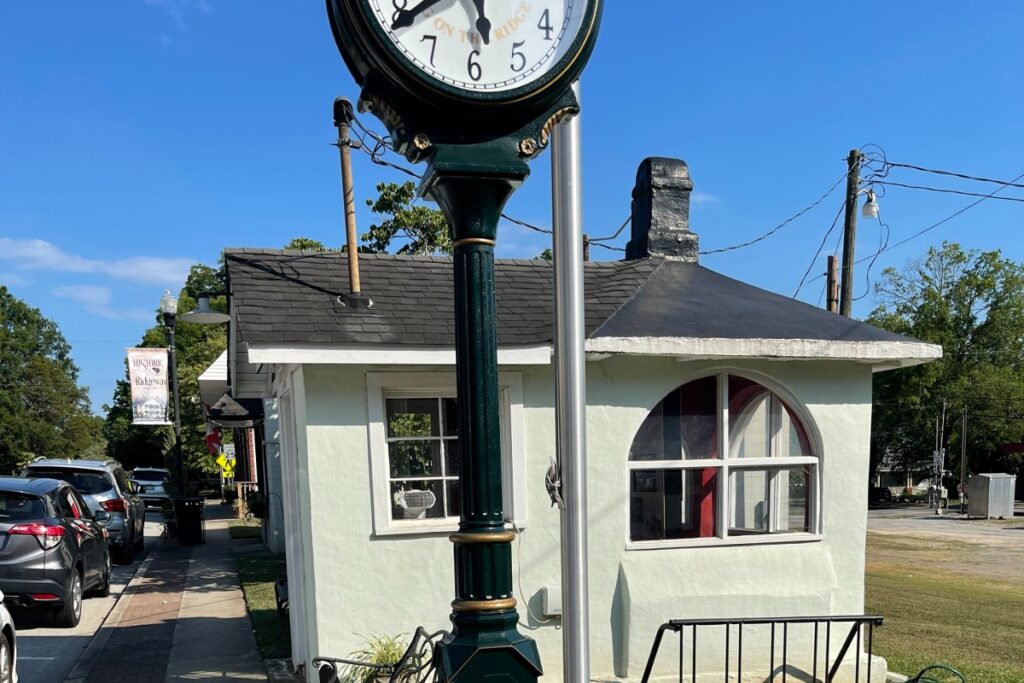STATEHOUSE REPORT | ISSUE 23.27 | July 5, 2024
BIG STORY: S.C. hemp farmers struggle after market collapsed
MORE NEWS: McMaster vetoes $2.3 million in $14 billion state budget
LOWCOUNTRY, Ariail: On the DOT and trees
COMMENTARY, Brack: Musings on elections, debate and the high court
SPOTLIGHT: Riley Institute at Furman University
MYSTERY PHOTO: Cute little building
FEEDBACK: Send us your thoughts
S.C. hemp farmers struggle after market collapsed

By Jack O’Toole, Capitol Bureau | A South Carolina hemp experiment that began six years ago on a wave of high hopes and big-dollar dreams has come crashing down on the hard realities of collapsing prices and inconsistent government regulations. Frustrated farmers and retail businesses are struggling in the wake.
Official S.C. Department of Agriculture (SCDA) numbers tell the tale. South Carolina experienced a rise from 20 state-licensed hemp farmers during a 2018 pilot program to 265 growersin 2020, followed by a nosedive to just 98 in 2024. And it’s not hard to see why. Hemp prices have fallen from up to$30 a pound to less than $5 a pound over the same period.
“There was a lot of broad interest in hemp farming during the first years of the program, but things have certainly settled down,” SCDA spokesperson Eva Moore told the City Paper. “The nationwide market for hemp grown for CBD got saturated very quickly, and farmers had to decide whether it made financial sense for them to stay in the business.”
For many, it didn’t.
A tough market for farmers

Clemson University agronomist David DeWitt has been a leader in the state’s efforts to make hemp work as a cash crop from the start. He says the SCDA program has been well-run, but that “market trends” have simply been too much for the industry to overcome.
“We were hoping it would become a real option for farmers as a true on-farm money maker,” he said in an interview. “But it just didn’t evolve to that due to the volume we could grow compared to what the market could stand.”
That supply-and-demand imbalance has been exacerbated by tight regulation on the farm end coupled with a complete lack of regulation on the retail side, he said.
For instance, DeWitt notes, under S.C. law, farmers can only grow hemp containing 0.3% or less of THC, the psychoactive substance in marijuana. But with no specific THC regulation for products like seltzers and gummies, the larger retail market that farmers need hasn’t been able to develop due to uncertainty about what’s legal and what isn’t.
“It can vary from county to county and city to city, as far as when a sheriff or police department will come in and take products off shelves,” DeWitt said. “The retailers just need answers.”
Former state Rep. Chip Limehouse of Charleston has seen the market problems firsthand on his farm in Aiken, where he had 22 acres of hemp under cultivation for several years before finally giving up his license in 2022.

He says that, in addition to the national issues with oversupply and a patchwork of state-by-state regulations, South Carolina got into the hemp business at almost precisely the wrong time, just as the market was peaking.
“We were a little late to the dance with so many other states approving similar measures,” Limehouse said. “And ever since, the market has just continued to go down, down, down, down, down.”
And that’s why the 22 acres he once dedicated to hemp are now producing tomatoes, he said.
A need for uniform retail regulation
Founded in 2021, Greenville’s Rebel Rabbit makes cannabis-infused seltzers that are formulated with all-natural cannabinoids from hemp grown in North Carolina and South Carolina. In addition, the company says its seltzers are independently tested to ensure they are within the .3% limit.
Nevertheless, they’ve had to work overtime to get, and keep, their products on store shelves. They say that was a particular challenge in February of this year, when the now former state Department of Health and Environmental Control (DHEC) issued new guidelines that initially appeared to ban most hemp-infused products.
“We wholeheartedly disagreed with that stance,” said Rebel Rabbit co-founder Pierce Wylie. “And with federal and state law on our side, they came back and changed their position to where it did create a path forward for the industry.”
Going forward, Wylie says the big challenge is at the federal level, where he believes Congress should impose uniform national standards for the industry. That way, he notes, big-box retailers like Walmart would be able to carry the products in all 50 states.
“We’re spearheading an initiative to create a beverage-specific coalition to lobby and educate legislators about the benefits we’re offering,” he said. “The goal is to create a path forward where this can be regulated just like alcohol is regulated.”
Next steps for farmers

According to experts, a better future for hemp in South Carolina will probably require two major changes: a new focus on hemp for industrial uses and the legalization of medical marijuana.
“In the future,” SCDA’s Moore said, “we would like to see the market continue to evolve toward providing more opportunities for growing hemp for fiber.”
Hemp fibers are used in products ranging from auto parts to paper to textiles. Economists say the market for hemp fibers is expected to quadruple in size over the next 10 years.
But just as important, some say, is medical marijuana.
“We need to foster and promote the cannabis industry in South Carolina, including a medical marijuana program in concert with our existing hemp program,” Limehouse said. “I’m a conservative Republican, but relative to medical marijuana, the benefits far outweigh any negatives.”
For the second legislative session in a row, a medical marijuana bill passed the S.C. Senate overwhelmingly but never received a vote in the House. The bill’s sponsor, Beaufort Republican Sen. Tom Davis, has pledged to bring it back next year.
- Have a comment? Send to: feedback@statehousereport.com.
McMaster vetoes $2.3 million in state budget

By Jack O’Toole, Capitol bureau | S.C. Gov. Henry McMaster vetoed 21 budget items worth $2.3 million in state spending Wednesday. That’s slightly less than 0.02% of the $14 billion 2024-25 budget that legislators sent to his desk on June 26.
The legislature, which would have to return to Columbia to overturn any vetoes, is not expected to oppose the revisions.
Nine of the vetoes cut actual spending, including about $650,000 for charitable organizations that McMaster said are not registered with the S.C. Secretary of State’s Office. The other 12 killed what are called budget provisos – directives to state agencies that lawmakers use to make policy changes without passing standalone legislation.
Among the now-defunct provisos were a pair of directives that would have weakened the state’s prohibition on private beach seawalls, and a provision creating a health care study committee to assess potential reforms in the state’s medical system, including the possibility of Medicaid expansion.
“I remain unconvinced that the expansion of Medicaid benefits – which this legislative study committee is tasked with considering – is necessary, nor do I believe it is fiscally responsible,” McMaster said in his veto message.
Overall, the governor said he was pleased with the budget, particularly its investments in roads and bridges, income tax cuts and higher teacher pay. He also went out of his way to note improvements in the earmarks process, which legislators use to fund pet projects in their districts.
“I applaud the General Assembly for their remarkable evolution and strides made with the disclosure of earmarked appropriations, which were previously shielded from public scrutiny or debate,” McMaster said.
- To read McMaster’s full budget statement and see a complete list of vetoes, visit governor.sc.gov.
In other recent news:
![]() Churches, small nonprofits in line for $90M in S.C. budget. The S.C. General Assembly’s budget plan for the fiscal year that started July 1 allocates more than $435 million in one-time spending on projects sponsored by legislators. About $90 million of that is slated for nonprofit organizations with little track records and churches.
Churches, small nonprofits in line for $90M in S.C. budget. The S.C. General Assembly’s budget plan for the fiscal year that started July 1 allocates more than $435 million in one-time spending on projects sponsored by legislators. About $90 million of that is slated for nonprofit organizations with little track records and churches.
S.C. ready to begin search for origin of $1.8B of missing funds. South Carolina is ready to start its search for the origins of $1.8 billion in taxpayer funding that sat unidentified and untouched in a bank account for more than five years.
Bill banning race-based curriculum fails. A bill banning the teaching of certain racial concepts in S.C. public schools died during the state legislature’s June special session, when the House and Senate were unable to agree on final language.
Cellphone ban in K-12 schools won’t happen immediately, officials say. The earliest that the State Board of Education can adopt a statewide policy is August, after most public schools are back in session. However, the ban isn’t likely to start until January.
New state agency unveils logo, pledges efficiency and pollution prevention. The new S.C. Department of Environmental Services pledged Monday to focus on protecting the state’s water, air and landscape from pollution, while improving service as the new agency takes over from the former Department of Health and Environmental Control.
DHEC to no longer oversee food safety; Dept. of Agriculture to take over. The S.C. Department of Agriculture has taken over several food safety duties previously managed by the former state Department of Health and Environmental Control, which split into two new agencies earlier this week.
DOT and trees

Nationally award-winning cartoonist Robert Ariail always has an interesting take. This week, he takes on the state Department of Transportation and tree-trimming in rights-of-way. What do you think – love the cartoon? Hate it? Send your thoughts to feedback@statehousereport.com.
Musings on elections, debate and the high court

By Andy Brack | After 14 years of conservative control in Great Britain, British voters on July 4 threw out the Tories in a shellacking that was heard around the world. They elected a government that will be run by the Labour Party, which won 412 of 650 seats in the House of Commons – a net gain of 214 seats. Meanwhile, the Conservative Party lost 253 seats in a debacle that can only be described as politically cataclysmic.
 Across the English Channel just days before, the moderate government of French President Emmanuel Macron faced a similar drubbing as the far-right National Rally party made big inroads in round one of the voting in France’s complicated national elections for its 577-seat National Assembly. Polling shows the far right and allies likely won’t be able to cobble together a ruling majority to replace a centrist government. But governing in France will face delays, stalls and quagmires over the next couple of years.
Across the English Channel just days before, the moderate government of French President Emmanuel Macron faced a similar drubbing as the far-right National Rally party made big inroads in round one of the voting in France’s complicated national elections for its 577-seat National Assembly. Polling shows the far right and allies likely won’t be able to cobble together a ruling majority to replace a centrist government. But governing in France will face delays, stalls and quagmires over the next couple of years.
So Britain and France? Why do their elections matter here? Because they show one clear thing: voters wanted change. In Britain, they wanted to throw out 14 years of increasingly conservative rule in a country struggling with national health care, growth and immigration. In France, many voters wanted to show frustration with the status quo and concern over immigration, the economy and more.
Sound familiar? Yes, these elections might provide a kind of crystal ball about what could happen here in November. But that’s kind of complicated because just what is the definition of change for American voters?
On one hand, change could mean throwing out Democratic President Joe Biden in favor of former President Donald Trump. But is that real change just to go back to what we had before? On the other hand, change could mean toppling a Trump juggernaut toward authoritarianism to protect reliable democratic (small d) institutions. Remember, Britain went to the left and France hasn’t turned everything over to the right.
Deflate the debate. Biden certainly didn’t help himself in the recent Atlanta CNN debate with a lackluster performance against Trump. But don’t forget that Trump wasn’t that great either thanks to misstatements, lies and damned lies – CNN counted 30 in the 90-minute debate. (Biden had nine misleading and wrong statements.)
What’s interesting is that American conservatives have been mostly quiet about the whole thing – not wanting to draw attention to their own performance issues. Why? Because national Democrats are in a hot panic that’s clogging the media with too many calling for Biden to drop out – after just one lousy debate.
They need to settle down and realize that at this late date, there’s really not enough time to launch a replacement candidate who could take Trump on and win. As the New York Times’ Charles Blow recently noted, “This has become an election about people who are for democracy and those who are not for it. It has nothing to do with the individual people and the individual characters and their individual competency.”
Court on ballot. What many pundits also don’t seem to realize is that voters know the U.S. Supreme Court will also be on the ballot in November. The next president will have at least two appointments, which could tip the balance of the court to the center or left if Democrats the White House. And after months of scandal over acceptance of hundreds of thousands of dollars of unreported gifts by Justice Clarence Thomas and ethical issues related to other conservative justices, many people are understandably tired and frustrated over a high court that’s making lots of headlines for the wrong things. Throw on top of that the court’s overturning of the Roe v. Wade abortion decision, and you have a major driver for moderate voters to vote against Trump, regardless of an elderly Biden or any other candidate.
Democrats need to settle down and face the music that Biden’s their best chance to defeat Trump. And Republicans may want to strap in for what happens to voting if Trump, the convicted felon, gets his freedom taken away if a judge sentences him just weeks before the election to house confinement or worse.
The wild ride is getting wilder. Hold on.
Andy Brack is editor and publisher of the Charleston City Paper and Statehouse Report. Have a comment? Send to: feedback@statehousereport.com.
Riley Institute at Furman University
 The public spiritedness of our underwriters allows us to bring Statehouse Report to you at no cost. This week’s spotlighted underwriter is Furman University’s Riley Institute, which broadens student and community perspectives about issues critical to South Carolina’s progress. It builds and engages present and future leaders, creates and shares data-supported information about the state’s core challenges, and links the leadership body to sustainable solutions.
The public spiritedness of our underwriters allows us to bring Statehouse Report to you at no cost. This week’s spotlighted underwriter is Furman University’s Riley Institute, which broadens student and community perspectives about issues critical to South Carolina’s progress. It builds and engages present and future leaders, creates and shares data-supported information about the state’s core challenges, and links the leadership body to sustainable solutions.
Launched in 1999, the Institute is named for former South Carolina Governor and former United States Secretary of Education Richard W. (Dick) Riley. It is committed to nonpartisanship in all it does and to a rhetoric-free, facts-based approach to change.
- Learn more about the Riley Institute.
- Also learn more about the Riley Institute’s Center for Education Policy and Leadership.
Cute little building

A reader sent in a photo of this cute little white building somewhere in South Carolina that has a particularly interesting significance. What and where is it? Send your name, hometown and guess to: feedback@statehousereport.com.
 Last week’s mystery, “More than an old field,” showed today’s look at the place where patriots fought the British during the Battle of Eutaw Springs, a key battle at the end of the Revolutionary War.
Last week’s mystery, “More than an old field,” showed today’s look at the place where patriots fought the British during the Battle of Eutaw Springs, a key battle at the end of the Revolutionary War.
Allan Peel of San Antonio, Texas, reminds us that the battle was the last in South Carolina during the war. “The battle was lead by Major General Nathanael Greene (1742 – 1786) of the American Patriots that attacked the British force, under the command of Colonel Alexander Stewart (1739 – 1794) on September 8, 1781, after Greene’s unsuccessful attempt at seizing Star Fort at Ninety-Six.”
David Lupo of Mount Pleasant added, “The Americans prevailed initially, but the British were able to regroup under Major Majoribank, who was wounded in the battle and later died. When the creation of Lake Marion flooded the site of his tomb, the tomb was moved to the Eutaw Springs Battlefield, where it remains today.”
Others correctly identifying the photo were: George Graf of Palmyra, Va.; Bill Segars of Hartsville; Pat Keadle of Perry; Elizabeth Jones and Jay Altman, both of Columbia; and Frank Bouknight of Summerville.
- Send us a mystery picture. If you have a photo that you believe will stump readers, send it along (but make sure to tell us what it is because it may stump us too!) Send to: feedback@statehousereport.com and mark it as a photo submission. Thanks.
Send us your thoughts
We encourage you to send in your thoughts about policy and politics impacting South Carolina. We’ve gotten some letters in the last few weeks – some positive, others nasty. We print non-defamatory comments, but unless you provide your contact information – name and hometown, plus a phone number used only by us for verification – we can’t publish your thoughts.
- Have a comment? Send your letters or comments to: feedback@statehousereport.com. Make sure to provide your contact details (name, hometown and phone number for verification. Letters are limited to 150 words.
ABOUT STATEHOUSE REPORT
Statehouse Report, founded in 2001 as a weekly legislative forecast that informs readers about what is going to happen in South Carolina politics and policy, is provided to you at no charge every Friday.
- Editor and publisher: Andy Brack, 843.670.3996
- Statehouse bureau chief: Jack O’Toole
Donate today
We’re proud to offer Statehouse Report for free. For more than a dozen years, we’ve been the go-to place for insightful independent policy and political news and views in the Palmetto State. And we love it as much as you do.
But now, we can use your help. If you’ve been thinking of contributing to Statehouse Report over the years, now would be a great time to contribute as we deal with the crisis. In advance, thank you.
More
- Mailing address: Send inquiries by mail to: P.O. Box 21942, Charleston, SC 29413
- Subscriptions are free: Click to subscribe.
- We hope you’ll keep receiving the great news and information from Statehouse Report, but if you need to unsubscribe, go to the bottom of the weekly email issue and follow the instructions.
- Read our sister publication: Charleston City Paper (every Friday in print; Every day online)
- © 2024, Statehouse Report, a publication of City Paper Publishing, LLC. All rights reserved.


